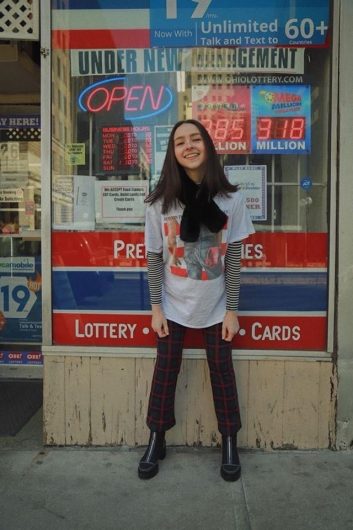
Marisa Dzwonczyk became the editor-in-chief of High Street Style in December 2016. Credit: Courtesy of Eudola Shao
Empathetic, creative, dynamic, witty and learning –– these are the five words High Street Style editor-in-chief Marisa Dzwonczyk chose to describe herself.
A third-year in international business with a minor in fashion and retail studies, Dzwonczyk applied to Ohio State as a psychology major with the intention of going to law school, but she quickly realized that following her long-time passion was more important.
“I’ve always been so in love with fashion,” Dzwonczyk said. “As a kid, I remember playing with dolls. I was super into dolls and all their clothes and everything, and I would always set it up so that my Polly Pockets were running a fashion design company, and I would set up little offices for them.”
In 2016, Dzwonczyk joined Fashion Forward, which is now known as the Business of Retail Association, where she met Tina Lorek, creator of O-Style –– a student organization with a fashion blog created by and for students. After being asked to write for the blog, Dzwonczyk was eventually asked to take over for Lorek.
“Writing about fashion was never something that I super considered, but once I started doing it, I loved it,” Dzwonczyk said. “I’ve always enjoyed writing and been pretty good at it, and then I found that being able to apply that to fashion has been so much fun and a really good experience.”
In December 2016, Dzwonczyk became the editor-in-chief of O-Style and rebranded the group into High Street Style –– a fashion, music and lifestyle blog. Since then, the blog has grown to a group of 15 to 20 contributors of a variety of writing levels, majors and backgrounds.
Dzwonczyk said the diversity of the blog’s content reflects the diversity of its writers.
“It’s not just American, white people who are writing for this, which is kind of what a lot of the fashion world is now,” Dzwonczyk said. “There’s not a ton of coverage in the United States of other cultures, so I think that that’s a really important thing to tie people together in this way.”
Though students in the organization are encouraged to write in their own voice, Dzwonczyk writes exclusively about fashion, but with a humorous twist, taking more obscure angles in her editorials.

Dzwonczyk’s fashion influences include models Bella Hadid andTeddy Quinlivan who are known for their street style photographs. Other inspiration comes from her favorite fashion blog Man Repeller. Credit: Courtesy of Eudola Shao
In one of her latest posts, Dzwonczyk wrote a recap of fashion month — a four-week period containing four of the largest fashion shows in the world — but instead of a review, she summarized every designer collection by what each woman from “Sex and the City” would be wearing from brands such as Tom Ford, Gucci and Marc Jacobs.
“It’s always about fashion, but I always try to make it funny and connect it to what somebody in college could enjoy reading,” she said. “I don’t want it to be too highbrow. I’m not buying thousand-dollar clothes. A big part of my style is finding designer looks for an affordable price and still looking good and still looking like it’s expensive.”
As a college student, Dzwonczyk practices what she preaches by sourcing her fashion from affordable outlets.
Dzwonczyk’s personal style is always changing depending on her mood or the occasion. Some of her major influences include street style from models like Bella Hadid and Teddy Quinlivan are major influences.
“It’s very dynamic and I’m always trying to absorb new things and have a lot of clothes, which is hard,” she said. “Until I can afford designer, got to fake it till you make it.”
Dzwonczyk’s style isn’t just limited to clothing, she also uses her writing to make statements.
From its inception, the fashion industry has been known for its mistreatment of women, and with movements like Time’s Up and #MeToo, these issues have come to the forefront.
“Fashion is so connected and influential in culture and politics, and from everything that I have seen, the fashion industry is so vocal about those things, especially gender equality, which is really cool to me,” Dzwonczyk said. “I think that they make a lot of strides that there aren’t in other sectors because they’re not afraid to push the boundaries of what gender is and how a man and a woman can be represented in photography or in media.”
In the future, Dzwonczyk sees herself working with a fashion magazine. She’s hoping this recent movement will allow her to use her platform to talk about political issues in a way that’s connected to fashion.
“I don’t think fashion has had the opportunity to do that and really be respected as a voice in those issues,” she said.


